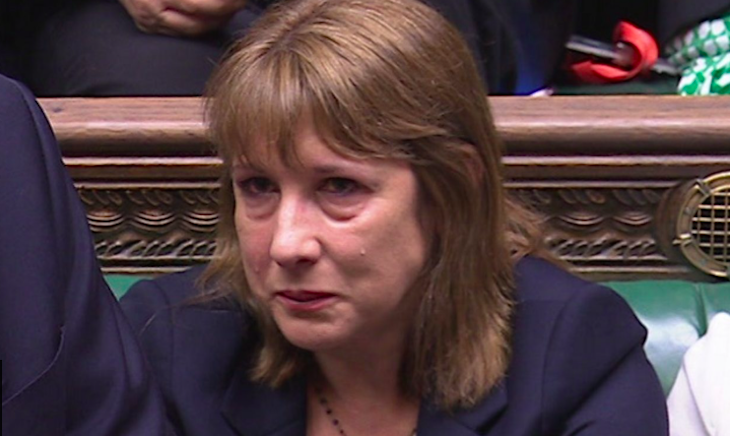The scenes of a tearful Rachel Reeves are all anyone is likely to remember from yesterday’s Prime Minister’s Questions. The Chancellor wept openly, her expression distraught; it was difficult to watch. The death of Princess Diana and the extraordinary outpourings of public grief that followed marked the end of stiff-upper-lip Britain. Vestiges remain, however, and we still become uncomfortable at the sight of the prominent and powerful brought to tears. It triggers a Pavlovian response in much the same way that the mention of religion in polite company has our toes scrunching in our shoes, as we try to dig a hole to escape the awkwardness.
The tearful politician has been with us for some time
In fact, the tearful politician has been with us for some time. Andrew Roberts notes that Winston Churchill’s ‘astonishing lachrymosity could be unleashed at minor moments as well as on great occasions, especially if martial music was involved’. Examples included tearing up on a visit to an East End air raid shelter during the Blitz, while singing ‘O God Our Help In Ages Past’ with FDR aboard the USS Augusta, and after watching historical drama That Hamilton Woman (Alexander Korda, 1941).
For Brits over a certain age, a defining political memory will be Margaret Thatcher’s tear-stained exit from Number 10. Her voice trembled as she announced: ‘Ladies and gentlemen, we’re leaving Downing Street for the last time,’ but the brave face gave way once she was bundled into the back of the car that would carry her away from power. A camera flash penetrated the tinted windows and revealed the haunted eyes and clasped lip of a commander betrayed by her own infantrymen.
Twenty-nine years later, Theresa May trod the same cobbled steps to fall on her own sword, though much like her predecessor the mortal wounds had been delivered by the daggers of her own colleagues. May held up longer than Thatcher but began to waver when she spoke of ‘the job that it has been the honour of my life to hold’ and there was a pronounced crack in her timbre at mention of being ‘the second female prime minister’. But it was in the final words of her statement, when she expressed her ‘enormous and enduring gratitude’, that her composure crumbled, so that she closed several octaves higher, on ‘serve the country that I love’, and you could feel her heart ache with each syllable.
While Thatcher’s tears elicited schadenfreude from her enemies on the left, May’s sniffles evoked a little more sympathy due to the sheer impossibility of the feat she had taken on: getting Brexit through an anti-Brexit parliament and a soft Brexit through a hard Brexit party. There was markedly less sympathy for Matt Hancock during his lachrymose tenure as health secretary, epitomised by his choking up while discussing the Covid vaccine rollout on Good Morning Britain. Hancock’s Kleenex moments became so prolific that they were mocked by Spitting Image and even had Good Morning Britain questioning how sincere the waterworks were.
Public lamentations by the political classes aren’t just a British phenomenon. Even less sympathetic than Hancock is Japanese lawmaker Ryutaro Nonomura, who went viral in 2014 for bawling hysterically in a press conference called to rebut allegations that he had fraudulently claimed expenses. He was later convicted of misusing public funds, and is now a relationship guru and host of ‘Ryutaro Nonomura’s Love Story Channel’. (I’m not making this up.)
Hillary Clinton choked up during a televised reading of the presidential victory speech she never got to give in 2016, an act of such solipsism you can appreciate why the American people opted for the reality TV sociopath instead. Former Republican House Speaker John Boehner bleated so often — when he was sworn in, when he met the Pope, when he had a conversation with the prime minister of Estonia — that blubbing is his principal legacy. Edmund Muskie, a serious contender for the Democrat presidential nomination in 1972, was thought to have sunk his chances when a speech in New Hampshire defending his wife from criticism of her lifestyle opened the floodgates. Other leaders manage to snot up but retain their dignity in the long run. Israeli prime minister Menachem Begin famously sobbed during a radio broadcast on the Altalena affair while Australians recall Bob Hawke being overcome during a speech describing the horrors of the Tiananmen Square massacre.
Politics is an unforgiving business. One of Hawke’s successors, Julia Gillard, remembers a phone call from another former PM, the eternally blunt Paul Keating, the day after she was deposed in a party room coup. ‘We all get taken out in a box, love,’ came the voice on the other end of the line. It was intended as a consolation. Yet the brute realities and sudden betrayals that await all who walk the corridors of power are of little interest to the voters. They don’t have warm and fuzzy feelings for Chancellors at the best of times, and certainly not in times of economic hardship. Our upper lips might not be so stiff anymore but they curl in cruelty when a politician blubbers.
Whatever the source of Rachel Reeves’ sorrows, the political and media classes will be far more sympathetic than the voters. Whether her anguish is personal or political, most hearts across the country have already hardened against her. Many MPs and journalists will find that hard to believe — what if some terrible family loss is involved? — but as in so many things proximity to Westminster is distance from the voters, and the voters are not merely angry but contemptuous towards this government.
A little more graciousness would benefit us all, a recognition of life’s difficulties and complexities, even just a fleeting pang of empathy for our common human frailty, but don’t count on it in this case. If the Chancellor had any idea just how thoroughly the public loathes her and her colleagues, she really would weep.








Comments